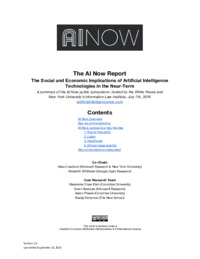The AI Now ReportThe Social and Economic Implications of Artificial Intelligence Technologies in the Near-Term
Kate Crawford, Meredith Whittaker
Publikationsdatum:
|
 |
 Diese Seite wurde seit mehr als 7 Monaten inhaltlich nicht mehr aktualisiert.
Unter Umständen ist sie nicht mehr aktuell.
Diese Seite wurde seit mehr als 7 Monaten inhaltlich nicht mehr aktualisiert.
Unter Umständen ist sie nicht mehr aktuell.
 Zusammenfassungen
Zusammenfassungen
A summary of the AI Now public symposium, hosted by the White House and
New York University’s Information Law Institute, July 7th, 2016
Von Kate Crawford, Meredith Whittaker im Text The AI Now Report (2016) Artificial intelligence (AI) refers to a constellation of technologies, including machine
learning, perception, reasoning, and natural language processing. While the field has
been pursuing principles and applications for over 65 years, recent advances, uses, and
attendant public excitement have returned it to the spotlight. The impact of early AI
systems is already being felt, bringing with it challenges and opportunities, and laying the
foundation on which future advances in AI will be integrated into social and economic
domains. The potential wide-ranging impact make it necessary to look carefully at the
ways in which these technologies are being applied now, whom they’re benefiting, and
how they’re structuring our social, economic, and interpersonal lives.
AI Now was the final in a five-part series of convenings spearheaded by the White House Office of Science and Technology Policy and the National Economic Council. Each event examined AI from a different perspective, ranging from law and governance, to AI safety and control, to the potential use of AI for public good, to the potential futures of AI.
Now complemented these approaches by focusing on the social and economic impacts of AI over the next ten years, offering space to discuss some of the hard questions we need to consider, and to gather insights from world-leading experts across diverse disciplines. We asked questions such as: what are the present social and economic issues raised by the rapid deployment of AI, and how can we build a deeper understanding of AI in the contemporary moment that will help us create a fair and equitable future?
To focus and ground the discussion, AI Now looked at AI in relation to four key themes: Healthcare, Labor, Inequality, and Ethics.
Von Kate Crawford, Meredith Whittaker im Text The AI Now Report (2016) AI Now was the final in a five-part series of convenings spearheaded by the White House Office of Science and Technology Policy and the National Economic Council. Each event examined AI from a different perspective, ranging from law and governance, to AI safety and control, to the potential use of AI for public good, to the potential futures of AI.
Now complemented these approaches by focusing on the social and economic impacts of AI over the next ten years, offering space to discuss some of the hard questions we need to consider, and to gather insights from world-leading experts across diverse disciplines. We asked questions such as: what are the present social and economic issues raised by the rapid deployment of AI, and how can we build a deeper understanding of AI in the contemporary moment that will help us create a fair and equitable future?
To focus and ground the discussion, AI Now looked at AI in relation to four key themes: Healthcare, Labor, Inequality, and Ethics.
 Dieser Text erwähnt ...
Dieser Text erwähnt ...
 Personen KB IB clear | Sam Altman , Lisanne Bainbridge , Frank Pasquale | ||||||||||||||||||
 Aussagen KB IB clear | Algorithmen können Diskriminierung fördernalgorithms can promote discrimination.
Machine Learning kann bestehende Vorurteile/Ungerechtigkeiten verstärken/weitertragen | ||||||||||||||||||
 Begriffe KB IB clear | Ethikethics
,  Intelligenz Intelligenz intelligence
, intelligence
,  Künstliche Intelligenz (KI / AI) Künstliche Intelligenz (KI / AI) artificial intelligence
, artificial intelligence
,  machine learning machine learning
| ||||||||||||||||||
 Bücher |
| ||||||||||||||||||
 Texte |
|
 Tagcloud
Tagcloud
 Zitationsgraph
Zitationsgraph
 Zitationsgraph (Beta-Test mit vis.js)
Zitationsgraph (Beta-Test mit vis.js)
 2 Erwähnungen
2 Erwähnungen 
- There is a blind spot in AI research (Kate Crawford, Ryan Calo) (2016)


- Diskriminierungsrisiken durch Verwendung von Algorithmen - Eine Studie, erstellt mit einer Zuwendung der Antidiskriminierungsstelle des Bundes. (Carsten Orwat) (2019)


 Volltext dieses Dokuments
Volltext dieses Dokuments
 |  The AI Now Report: Artikel als Volltext ( The AI Now Report: Artikel als Volltext ( : :  , 338 kByte; , 338 kByte;  : :  2021-03-21) 2021-03-21) |
 Anderswo suchen
Anderswo suchen 
 Beat und dieser Text
Beat und dieser Text
Beat hat Dieser Text während seiner Zeit am Institut für Medien und Schule (IMS) ins Biblionetz aufgenommen. Beat besitzt kein physisches, aber ein digitales Exemplar. Eine digitale Version ist auf dem Internet verfügbar (s.o.). Es gibt bisher nur wenige Objekte im Biblionetz, die dieses Werk zitieren.








 Biblionetz-History
Biblionetz-History